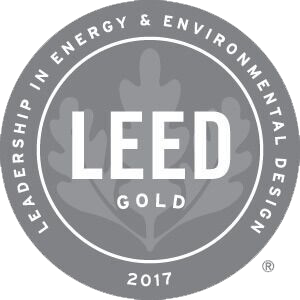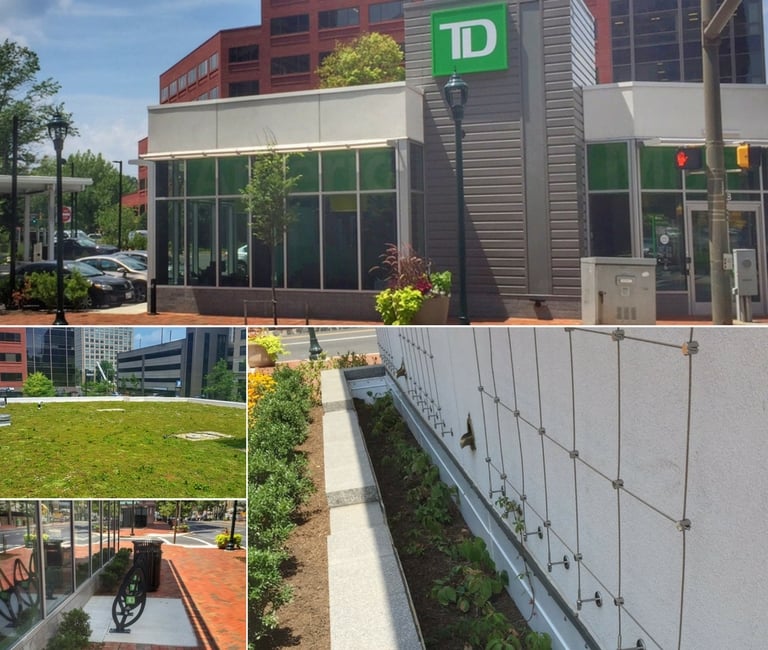
About Us
R.W. Murray Co. receives LEED Gold Certification on TD Bank project located in Bethesda, Maryland.
R.W. Murray Co. proudly announces that it has been awarded LEED Gold Certification on its TD Bank-Bethesda project. The LEED (Leadership in Energy and Environmental Design) rating system, developed by the U.S. Green Building Council (USGBC), is the foremost program for buildings, homes and communities that are designed, constructed, maintained and operated for improved environmental and human health performance.
R.W. Murray Co. achieved LEED certification for implementing practical and measurable strategies and solutions aimed at achieving high performance in: sustainable site development, water savings, energy efficiency, materials selection, and indoor environmental quality.
LEED is the foremost program for the design, construction, and operation of green buildings. More than 82,000 commercial and institutional projects are currently participating in LEED, comprising more than 1.85 million certified square feet of construction space in all 50 states and more than 162 countries and territories.
“Achieving LEED certification is more than implementing sustainable practices. It represents a commitment to making the world a better place and influencing others to do better,” said Mahesh Ramanujam, President and CEO, USGBC. “Given the extraordinary importance of climate protection and the central role of the building industry in that effort, R.W. Murray Co. demonstrates their leadership through their LEED certification of their TD Bank-Bethesda project.”
There are many factors and various aspects of the construction and design that determine whether a project is fit to achieve LEED certification. Strategies to obtain this certification must be executed throughout the entirety of the project, as was the case for R.W. Murray Co. and TD Bank-Bethesda. One of the LEED Gold standards R.W. Murray Co. wanted to consider was sustainability in terms of Location and Transportation. In this case, the public transportation, pedestrian and bike transportation options, along with the nearby available housing, created sustainability within this site location. In the category of Materials & Resources, R.W. Murray Co. focused on construction waste management by recycling 90% of their construction waste, surpassing the LEED Gold standard of 75%. Additionally, according to LEED specifications, at least 10% of the construction materials used to construct the building must come from re-used materials; whereas R.W. Murray Co. obtained 14%. Lastly, while only 20% of materials used on any LEED Gold certified project are required to be regionally manufactured (within a radius of less than 500 miles), R.W. Murray Co. managed to procure 49% of their materials regionally.
Indoor Environmental Quality is also hugely important for any LEED certified project. In order to meet the LEED expectations in this category, R.W. Murray Co. conceived a construction indoor air quality management plan, which was implemented both during construction and before occupancy. This included a strict “No Smoking” policy; smoking was not allowed at any time during the construction process. “No Smoking” signage was placed around the site, and this policy was enforced within 500 feet of the building. Additionally, all of the ductwork and HVAC equipment were capped and protected during installation, eliminating the possibility of dust or other construction debris from entering and disrupting the HVAC system. Just as important, an outdoor air delivery monitoring system was also performed during the project and only equipment with low emissions was used. Furthermore, low emitting materials were used during the construction processes involving adhesive, sealants, painting, coating, and the flooring system, with the effect of low to no Volatile Organic Compounds (VOC’s) generated.
Finally, under the condition of Water Savings, came the introduction of the green roof, bio retention basins, and the selection of plants throughout the site. The green roof was developed and designed with specific soil media and plants to absorb rainfall and store water to continue to live and thrive with minimal upkeep required. Excess water from the green roof was designed to discharge into a bio retention basin which also supported additional landscaping shrubs and consisted of a sandy soil mixture to allow for a slow run off out into the storm system.
Eric Biskaduros, Project Manager for the TD Bank-Bethesda project, shares, “It was great to be a part of this project. This was my first project to become LEED Certified, and I could not be more proud of the outcome. While it was a lot of hard work by the whole team, it’s great to see all of our efforts pay off and we completed an amazing building. I look forward to working on more projects under LEED standards in the future.”
In addition to this project being a LEED Certified building, it was also built to WELL Building Standards. These standards consist of features across seven concepts that comprehensively address not only the design and operations of the building, but also how they impact and influence human behaviors related to health and well-being. The seven concepts being: Air, Water, Nourishment, Light, Fitness, Comfort, and Mind. R.W. Murray Co. is proud that the TD Bank-Bethesda project represents one of the first commercial buildings on the east coast to be built to these standards.


